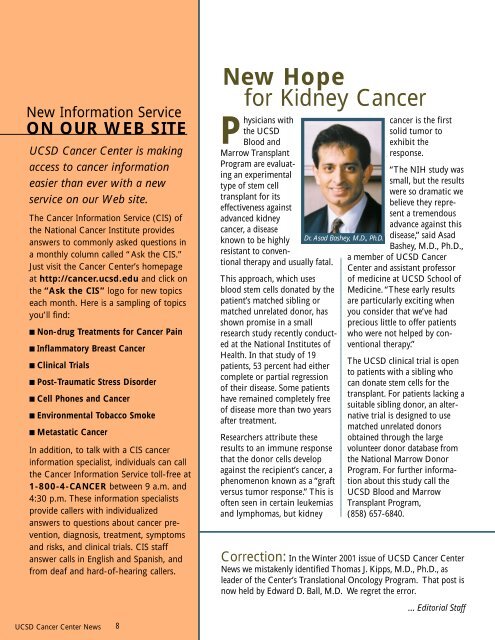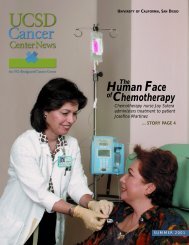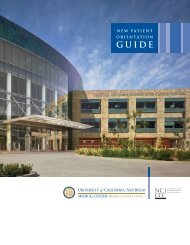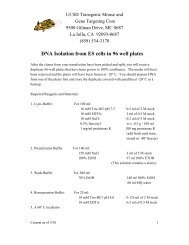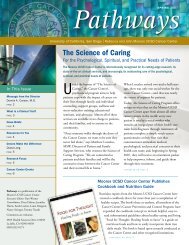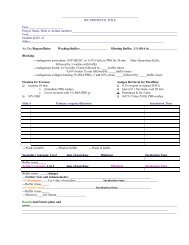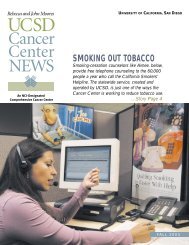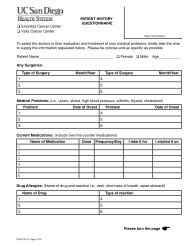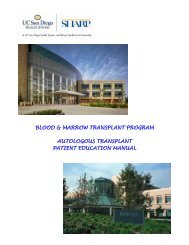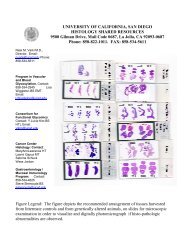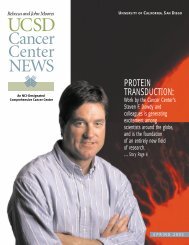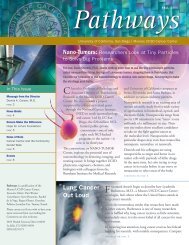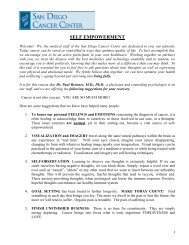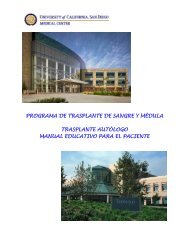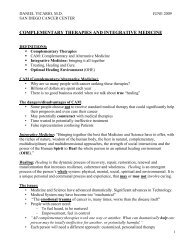FORCANCER - Moores Cancer Center
FORCANCER - Moores Cancer Center
FORCANCER - Moores Cancer Center
You also want an ePaper? Increase the reach of your titles
YUMPU automatically turns print PDFs into web optimized ePapers that Google loves.
New Information Service<br />
ON OUR WEB SITE<br />
UCSD <strong>Cancer</strong> <strong>Center</strong> is making<br />
access to cancer information<br />
easier than ever with a new<br />
service on our Web site.<br />
The <strong>Cancer</strong> Information Service (CIS) of<br />
the National <strong>Cancer</strong> Institute provides<br />
answers to commonly asked questions in<br />
a monthly column called “Ask the CIS.”<br />
Just visit the <strong>Cancer</strong> <strong>Center</strong>’s homepage<br />
at http://cancer.ucsd.edu and click on<br />
the “Ask the CIS” logo for new topics<br />
each month. Here is a sampling of topics<br />
you’ll find:<br />
■ Non-drug Treatments for <strong>Cancer</strong> Pain<br />
■ Inflammatory Breast <strong>Cancer</strong><br />
■ Clinical Trials<br />
■ Post-Traumatic Stress Disorder<br />
■ Cell Phones and <strong>Cancer</strong><br />
■ Environmental Tobacco Smoke<br />
■ Metastatic <strong>Cancer</strong><br />
In addition, to talk with a CIS cancer<br />
information specialist, individuals can call<br />
the <strong>Cancer</strong> Information Service toll-free at<br />
1-800-4-CANCER between 9 a.m. and<br />
4:30 p.m. These information specialists<br />
provide callers with individualized<br />
answers to questions about cancer prevention,<br />
diagnosis, treatment, symptoms<br />
and risks, and clinical trials. CIS staff<br />
answer calls in English and Spanish, and<br />
from deaf and hard-of-hearing callers.<br />
New Hope<br />
for Kidney <strong>Cancer</strong><br />
Physicians with<br />
the UCSD<br />
Blood and<br />
Marrow Transplant<br />
Program are evaluating<br />
an experimental<br />
type of stem cell<br />
transplant for its<br />
effectiveness against<br />
advanced kidney<br />
cancer, a disease<br />
known to be highly<br />
resistant to conventional<br />
therapy and usually fatal.<br />
This approach, which uses<br />
blood stem cells donated by the<br />
patient’s matched sibling or<br />
matched unrelated donor, has<br />
shown promise in a small<br />
research study recently conducted<br />
at the National Institutes of<br />
Health. In that study of 19<br />
patients, 53 percent had either<br />
complete or partial regression<br />
of their disease. Some patients<br />
have remained completely free<br />
of disease more than two years<br />
after treatment.<br />
Researchers attribute these<br />
results to an immune response<br />
that the donor cells develop<br />
against the recipient’s cancer, a<br />
phenomenon known as a “graft<br />
versus tumor response.” This is<br />
often seen in certain leukemias<br />
and lymphomas, but kidney<br />
Dr. Asad Bashey, M.D., Ph.D.<br />
cancer is the first<br />
solid tumor to<br />
exhibit the<br />
response.<br />
“The NIH study was<br />
small, but the results<br />
were so dramatic we<br />
believe they represent<br />
a tremendous<br />
advance against this<br />
disease,” said Asad<br />
Bashey, M.D., Ph.D.,<br />
a member of UCSD <strong>Cancer</strong><br />
<strong>Center</strong> and assistant professor<br />
of medicine at UCSD School of<br />
Medicine. “These early results<br />
are particularly exciting when<br />
you consider that we’ve had<br />
precious little to offer patients<br />
who were not helped by conventional<br />
therapy.”<br />
The UCSD clinical trial is open<br />
to patients with a sibling who<br />
can donate stem cells for the<br />
transplant. For patients lacking a<br />
suitable sibling donor, an alternative<br />
trial is designed to use<br />
matched unrelated donors<br />
obtained through the large<br />
volunteer donor database from<br />
the National Marrow Donor<br />
Program. For further information<br />
about this study call the<br />
UCSD Blood and Marrow<br />
Transplant Program,<br />
(858) 657-6840.<br />
Correction: In the Winter 2001 issue of UCSD <strong>Cancer</strong> <strong>Center</strong><br />
News we mistakenly identified Thomas J. Kipps, M.D., Ph.D., as<br />
leader of the <strong>Center</strong>’s Translational Oncology Program. That post is<br />
now held by Edward D. Ball, M.D. We regret the error.<br />
…Editorial Staff<br />
UCSD <strong>Cancer</strong> <strong>Center</strong> News<br />
8


